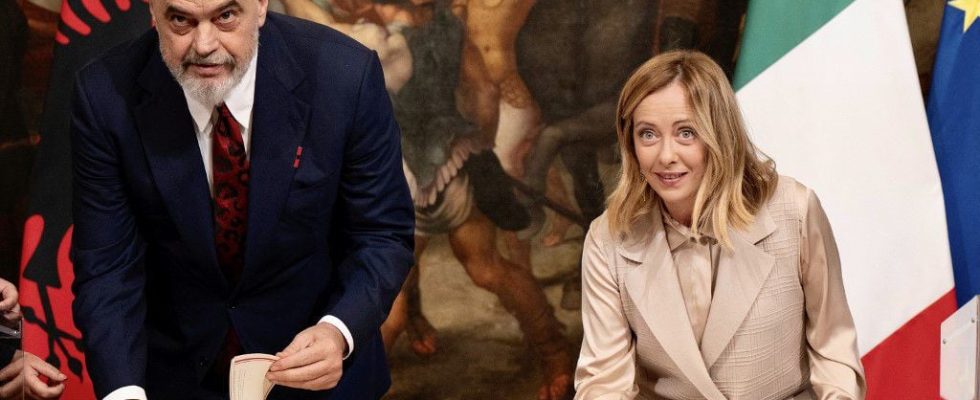From the azure of the Albanian coast to the gold of the Chigi Palace. Taken this summer on a yacht and then in Rome, the photos of the President of the Italian Council Giorgia Meloni and her Albanian counterpart Edi Rama showed the same complicity, between broad smiles and warm hugs. And we now know why the two leaders spent their vacation together: it allowed them to finalize in the greatest secrecy a memorandum of understanding, announced on November 6 to general astonishment. Described as “historic” by Giorgia Meloni, it will make it possible to outsource the management of the migration crisis from the shores of the Mediterranean to those of the Adriatic, by opening two reception structures for migrants on Albanian territory. A project inspired by that of another friend of the head of Fratelli d’Italia, British Prime Minister Rishi Sunak, who wanted to expel migrants who arrived illegally in the United Kingdom to Rwanda.
The agreement planned by Rome and Tirana is nevertheless different. Valid for five years and renewable for another five years, it provides for the construction of two centers in Albania which should be operational in spring 2024, the first in the port of Shengjin, where migrants will be sent for their identification, the second in the neighboring town of Gjader, which will serve as a pre-trial detention center. They will be entirely financed by Italy and placed under its jurisdiction, while their supervision will be entrusted to Albanian law enforcement. These structures will have a capacity to accommodate 3,000 people, who, as a condition of residing there, must have been rescued in the Mediterranean by the Italian navy, and not by an NGO ship. In total, around 39,000 asylum applications can be processed each year. Minors, pregnant women and vulnerable people will not be affected.
Tirana’s generosity is undoubtedly not free
“Italy will not be the refugee camp of the EU”, warned the President of the Council, taking note of the failure of the partnership agreement between Brussels and Tunis, signed under her aegis last July to stem migratory flows. More than 145,000 migrants have landed on the peninsula since the start of the year, compared to 88,000 during the same period in 2022. Criticizing the lack of solidarity from its European partners, Giorgia Meloni has therefore decided to turn towards a State non-EU neighbor. “If Italy launches an appeal, Albania responds, says its Prime Minister Edi Rama, who claims that this agreement is purely disinterested. We must stop seeing business everywhere.”
However, it is essential in bilateral relations. Italy is Albania’s largest trading partner, with trade between the two countries representing 20% of its GDP. If no economic clause was stipulated during the signing, Tirana’s generosity is undoubtedly not free. An underwater aqueduct project is to be carried out soon. It would connect Albania to Puglia, a region often affected by drought. The infrastructure, costing €1 billion, would create more than 8,000 jobs in Albania.
Another issue on which the Italian government could show its recognition is that of the pensions of the 500,000 Albanians who have worked on the peninsula and have been asking the transalpine authorities for years for recognition of their rights and, above all, for the payment of their pensions.
EU reservations
In the immediate future, Rome will mainly provide diplomatic aid, which is less costly. “Albania confirms that it is a friendly country. Although it is not yet part of the EU, it behaves as if it were a member state, greeted Giorgia Meloni. I am proud that Italy has always been among the countries supporting enlargement to the Western Balkans.” Tirana applied in April 2009 and was granted candidate country status for EU membership in June 2014 – final negotiations opened in July 2022.
The migration agreement raises many questions within the European Commission, which was only informed of it at the last moment, and was quick to express its reservations on respect for human rights. The Meloni government says that migrants entitled to international protection will be taken care of by Italy. What will happen to the others? Who will ensure repatriations? Where will they leave from? Which legislation will apply during transfers, Italian or Albanian? “We need to see the details,” insists a spokesperson for the European Commission. “We ask to receive detailed information to see the full application of EU rules on asylum.”
In Rome too, doubts and perplexity reign. Giorgia Meloni struck this deal alone. Neither the other members of the government coalition nor the Ministry of Foreign Affairs were informed, which sparked criticism of the way in which the head of government managed a very important issue for public opinion. But the Italian leader did not want to abandon her to her troublesome ally Matteo Salvini, leader of the League, who only seeks one thing: to exploit her for political purposes. As for the opposition, it criticizes the absence of “parliamentary discussion, political consensus, public analysis, transparency”. Riccardo Magi, the leader of the +Europa party, denounces a “real deportation in flagrant violation of international law, which will create a sort of Italian Guantanamo and which is only a new cruel propaganda initiative”. The opening of the two centers in Albania is planned for next spring, a few weeks before the European elections. It would represent a formidable campaign argument for Giorgia Meloni’s party.
.
